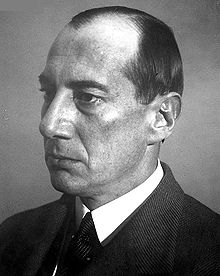Jozef Beck
Józef Beck (born October 4, 1894 in Warsaw , Russian Empire ; † June 5, 1944 in Stăneşti , Romania ) was a Polish politician, diplomat, colonel in the Polish army, close confidante of Józef Piłsudski and Polish Foreign Minister from 1932 to 1939.
Life

Beck came from a Polish Calvinist family whose ancestors immigrated from Flanders to Poland in the 16th century during the time of King Stephan Báthory . His father was an Austrian civil servant in Galicia . When the First World War broke out , he was a student at the Polytechnic in what was then the Austro-Hungarian Lemberg . He then joined the Polish Legions , who fought on the side of the Central Powers against Russia. He also became a member of the secret Polish Military Organization ( POW , Polish Polska Organizacja Wojskowa ), which was set up by Piłsudski.
In the first two years of the war, the Russian part of Poland was conquered by the Central Powers (see Eastern Front (First World War) ); After the establishment of the reign of Poland in November 1916, the Polish Legions were placed under German command ( Polish Wehrmacht ). A short time later, the legions were dissolved and the majority of the officers of these legions refused to take the oath of allegiance to the German emperor (" oath crisis ") because they mistrusted the German plans for Poland. Most of the officers were then interned. Beck escaped internment and went underground.
After the re-establishment of an independent Polish state after the end of the war ( Second Polish Republic ), he became an officer in the Polish General Staff, responsible for the intelligence service. In 1922/23 he was a military attaché in France. In 1926 he supported the Piłsudskis military coup. Between 1926 and 1930 he was Minister of Defense and between 1930 and 1932 Vice Prime Minister and Vice Foreign Minister. In 1932 he took over the management of the Ministry of Foreign Affairs at the request of Piłsudski.
In July 1932 Beck signed the Polish-Soviet non-aggression pact with the Soviet Union; in January 1934 signed the German-Polish non-aggression pact with the Nazi regime .
As Foreign Minister, he rejected the demands of the German Reich regarding the Polish Corridor and the Free City of Danzig , which Hitler took as the reason for the German attack on Poland .
Beck remained in office until the beginning of the Soviet occupation of Eastern Poland on September 17, 1939 and left Warsaw with other members of the government the following night for Romania , where he was interned by the authorities. Although he soon received a British entry visa , General Władysław Sikorski , an avowed political enemy of Piłsudski and his supporters, prevented Beck's departure from Romania. Beck remained under the supervision of the Romanian police and was initially assigned a villa in Bucharest as his place of residence, later a peasant cottage made of clay in the southern Romanian village of Stăneşti. There he wrote his memoirs entitled Ostatni raport (Final Report) and passed the time building model ships. He died there on June 5, 1944, presumably of tuberculosis . Beck was buried by a Hungarian pastor in a Calvinist cemetery. In 1991 his remains were transferred to Poland and buried in the military part of the Powązki Cemetery in Warsaw.
See also
literature
- Andrea Rudorff: Beck, Józef , in: Handbuch des Antisemitismus , Volume 2/1, 2009, pp. 62–64
Web links
- Literature by and about Józef Beck in the catalog of the German National Library
- Newspaper article about Józef Beck in the 20th century press kit of the ZBW - Leibniz Information Center for Economics .
- Opportunities for a Third Europe? On the reorientation of Polish foreign policy under Jozef Beck (1932–1939)
- Beck's speech to the Polish Sejm on May 5, 1939 (mp3, Polish; 2.4 MB)
Individual evidence
- ↑ Sławomir Koper: Polskie Piekiełko. Obrazy z życia elit emigracyjnych 1939–1945. Warszawa 2012, pp. 140-142.
| personal data | |
|---|---|
| SURNAME | Beck, Józef |
| BRIEF DESCRIPTION | Polish politician |
| DATE OF BIRTH | 4th October 1894 |
| PLACE OF BIRTH | Warsaw |
| DATE OF DEATH | June 5, 1944 |
| Place of death | Stăneşti (Giurgiu) , Romania |

